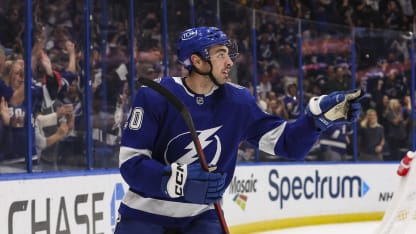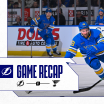Not every path to the NHL is the same.
There are players like Steven Stamkos, who get drafted with the first overall pick in the NHL Draft and immediately make the jump from junior hockey to the pros.
You have guys like Andrei Vasilevskiy, who play professional hockey in Europe, get drafted by an NHL team, spend a little time in the American Hockey League and make the move up to the big club.
Then there are players like Nick Paul, who spent the majority of his first four years as a professional hockey player in the AHL before earning a full-time roster spot with the big club in the NHL.
Despite the different routes that these three took to becoming regulars in the NHL, they all have one thing in common. Stamkos, Vasilevskiy and Paul have all signed contract extensions of seven or more years with the Tampa Bay Lightning.
The long road to Nick Paul's seven-year deal
It wasn't a smooth ascent for Paul, who had to overcome being passed three times through waivers before breaking through in the NHL

© Mark LoMoglio/Getty Images
Signing a contract of that length is undoubtedly a life-changing event. Players have the comfort of knowing the organization they play for has immense confidence in their abilities. Instead of renting an apartment while playing on a one- or two-year deal, buying a house becomes a more realistic option for players that have the security of knowing they'll be staying in the area for numerous years.
"It was amazing," said Lightning forward Brayden Point after he signed an eight-year contract extension with the Bolts in July of 2021. "I never thought growing up and playing that I would get something like that, so it's extremely special for me and my family.
"I feel very blessed to sign it and that's a lot of trust they've put in me. I just hope I can prove to them that I'm worth that contract."
After signing defenseman Mikhail Sergachev to an eight-year extension this offseason, Lightning general manager Julien BriseBois expressed that the young defenseman was ripe for the challenge of stepping into an expanded role with the Bolts.
For Sergachev, the upper management's belief in him as a player just gave him more confidence heading into a summer of training prior to this season. Now, he's leading all Lightning defensemen in points.
"When the coaches and the management trust you, you feel more confident," Sergachev explained. "You feel like you're going to do it and you're going to play well because they give you that extra confidence that you need.
"That actually just gave me more motivation, the contract and the words that he said. I kind of want to start practicing already, but I'll obviously take my time. It means a lot and just boosts your confidence."
There are currently 127 active NHL players that have signed a contract of seven or more years. One of those 127 players is Paul, who the Lightning acquired via trade last season before signing the restricted free agent to a seven-year deal in July.
But of those 127 players, there is only one that has played over 200 career games in the AHL. That would be Paul, who passed through waivers on three separate occasions during his time in the Ottawa Senators organization.
"He was a battler," said Troy Mann, head coach of the AHL's Belleville Senators. "Perseverance is probably the best word to describe Nick Paul. Multiple years in the minors. Placed on waivers multiple times. He was in a pretty dark place, feeling pretty low."
Mann took over as the head coach in Belleville at the start of the 2018-19 season after serving as head coach of the Hershey Bears for four years and had Paul on his team for parts of two seasons.
"From the first time I had a conversation with him, I knew he was just a really good guy," Mann said. "He was a real comedian in the locker room and well-liked by his teammates.
"Then you get on the ice with him and you see this 6-foot-6 guy that can shoot and pass and be a pretty good player at the American League level. He just hadn't reached his full potential yet.
"We built a relationship. We talked a lot about his game and where his game had to go to. We talked a lot about consistency.
"Then he just went on to have a great season. He played on a line that year with Logan Brown and Drake Batherson. We had our struggles early in the year, but they were certainly one of the best lines in the American League that whole year."
In Mann's first year with the team, Paul posted the best point per game average of his career in the AHL with 39 points in 43 games. The following season, he played three games in Belleville before earning a call-up. He hasn't left the NHL since.
But it wasn't all sunshine and rainbows along the way. Paul's confidence took a big hit when he didn't make the big club in 2019-20, Mann's second year as the head coach in Belleville. He made the jump to the NHL shortly after, but if it weren't for the help of Mann, Paul isn't sure if that jump would have ever happened.
"There was a point of my career there where I was at a bit of a crossroads," Paul said. "Do I go play overseas? What do I do with my career? Do I try to ask for a trade? What am I supposed to do?
"It's really hard going up and down and trying to find confidence and positivity, maybe harder than some people think. You have to have a good support system, keep a level head on your shoulders and just keep pushing.
"Troy Mann came in and he was huge in my success of making it to the NHL. He had me when I was at a real low point and feeling pretty down in terms of confidence. I'd kind of been kicked around a little bit, so him coming in, instilling that confidence and making me feel like I can play hockey again was a huge moment for my career."
After Paul played in a few preseason games before the start of the 2019-20 season, the Senators coaching staff still weren't sold on the big forward and placed him on waivers for the third time of his career.
"That was the lowest I'd seen him," Mann said. "I think everybody anticipated him making the team that year. I remember they went out to Vancouver to play two or three preseason games and they tried him on the penalty kill. He made some mistakes they weren't crazy about. Then they made the decision to waive him again.
"That's when we kind of had a heart to heart, when he came back down to Belleville. I said, 'You've just got to pick yourself up. Let's work on your penalty kill. Ultimately, if you want to play in the NHL and you want more than 5-on-5 ice time, you have to play on the penalty kill or power play. Otherwise, you become a seven- or eight-minute guy, really.'
"We worked on his positioning. We worked on his PK. He was great on the power play. He was big in front and sometimes in that bumper area because he could shoot the puck so well.
"He got off to a great start and then that was it. He went up and found himself a role. DJ Smith (Ottawa's head coach) started liking the player and started relying on him. He became a pretty important piece there."
Having coaches that believed in him went a long way for Paul. Smith had seen him play in the OHL and liked the tools he brought to the table.
For Paul, he knew he had the tools as well, but with the anguish of consistently going up and down weighing on his confidence, Mann was the coach who really made a difference.
"It all started with Troy Mann," Paul explained. "He found me in a spot where I was trying to be positive, mentally strong, and confident. But when you're getting sent down and put on waivers and nobody picks you up, it's hard. You get called up for a game, put on waivers again. Nobody picks you up. It's not easy.
"But he was always there telling me how much skill I had and how he knew I could make plays. If I needed to make a toe drag or take it to the net or do the extra move, he told me to do it. He always told me I'm good enough to make those plays. It was just him making me feel like I was that same player coming out of junior.
"Suddenly I felt like I had really become a difference maker and that was huge. From there I was just building and building and building. Now, I can see the difference when you're playing with confidence versus when you're playing and worrying about making mistakes."
As Paul's mentality shifted, his game continued to grow. He continued to find ways to make himself more serviceable as a player. He worked on faceoffs, PK, skating, and fitness. He was willing to play any position and impressed coaches with his hockey IQ and ability to quickly pick up systems.
As his game became more multi-faceted, Paul found himself taking big faceoffs near the end of games. He was earning time on special teams. The coaches began to trust and rely on him.
"The coaching staff really started to have confidence that I could not only be a PK guy, but I could play all over, whether it was center, left wing, right wing, PK, or the last minute of a game," said Paul. "Wherever they needed me, I was willing to fill that role, so I just constantly worked on getting better at different things.
"Be good on draws and win your faceoffs then all of a sudden, you'll find yourself out there in the last minute of the game. Maybe you end up on the PK or the power play just because it's a big draw.
"I worked really hard to get better on draws and then I was like, 'OK, what else can I do?'
"I tried hard to block shots on the PK and get the puck out. I worked on being stronger on my stick. That versatility kind of helped me stay in the NHL and find all different kinds of roles. It was a long, hard journey, but at the same time, I'm really thankful for all the things I've learned and how I appreciate the game."
After two and a half seasons of being an NHL regular, Paul experienced a new kind of challenge when he was traded to Tampa Bay. With his contract nearing an end, negotiations weren't going the smoothest with Ottawa and Paul sat out a few games as the trade deadline approached. A trade was inevitable, but Paul had no idea where he'd end up.
"I had no clue where I was going and then I got a call and ended up here," Paul said. "I couldn't have been more excited.
"I got to go on a Stanley Cup run. The fans are amazing. The weather's amazing. Just being able to get a chance to play playoff games, I didn't get that in the six or seven years I was playing. I couldn't have been more excited to get here."
Paul became a key player for the Bolts down the stretch and into the postseason. He was taking important faceoffs and killing penalties. He could play a shutdown role or get in on the offense.
In 21 regular season games with the Lightning, Paul scored five goals and picked up 14 points. He recorded a plus-four rating and won 56 percent of his faceoffs. He went on to play in every single playoff game.
When Tampa Bay's back was against the wall in Round One against the Toronto Maple Leafs, it was Paul who stepped up, scoring both of the Lightning's goals in a 2-1 win in Game 7 in Toronto.
While the Bolts fell short of their ultimate goal with a season-ending Game 6 loss to the Colorado Avalanche in the Stanley Cup Final, Paul showed throughout the playoffs that he was a piece that made Tampa Bay a better hockey team.
He finished the postseason with nine points (5G, 4A) and ranked tied for fifth among Lightning forwards in goals and assists. He took more faceoffs than any Tampa Bay skater and led all Bolts forwards in shorthanded time on ice. His 25 blocked shots were one shy of the team lead among forwards.
Heading into free agency, Paul's playoff performance surely garnered interest from teams around the league, but BriseBois had no plans of letting the restricted free agent hit the open market.
"I think we had a good read on him as a player," BriseBois said. "I think him getting to play in NHL Playoffs, which he hadn't done before, allowed him to showcase how much of a gamer he is.
"If anything, that's probably the quality that stands out to me. He was a big-time gamer. He fought through a lot of injuries for a long time and was still performing at a really high level all the way up to Game 6 of the Stanley Cup Final. Really impressive."
Then came the life-changing day. On July 1, 2022, Paul signed his seven-year, $22,050,000 contract extension with Tampa Bay. Paul's contract carries a no-trade clause for the first four seasons and a modified no-trade clause for the final three.
"Seven years is a long time," said Paul following the announcement of his extension. "For them to have that confidence in me and to believe that I'm just going to better my game and be a better player and continue to help this team be successful, and they see that for seven years, is really huge.
"When I talked to Julien, he really appreciated what I bring to the table and we had a good talk about where my future is headed and what I need to do and what he likes about my game.
"After talking with him and seeing how much they wanted me, it wasn't a hard decision for me. I wasn't looking around. I knew that this was where I wanted to be and, thankfully, we got it done."
For Paul, the seven-year deal is something he'll never take for granted. His journey to the NHL is unlike any other. From taking seven-hour bus rides in the AHL to scoring the game-winning goal in a Game 7 against the team he grew up rooting for, it's the entire process of getting to the NHL that provides Paul with perspective.
"Going up and down like that kind of grooms you to stay positive and stay mentally strong," explained Paul. "I can wake up every morning and say, 'Okay, I'm signed here. They want me. I got an NHL contract. Life's good.'
"I don't have to worry about going down the next day and restarting the entire process. The whole thing just taught me the importance of staying mentally strong and confident.
"When I'm having bad days and when I'm going through stuff, I just think of the lifestyle that I have with the opportunity of living and sharing with my friends and family.
"There's going to be tough days. I'm not always going to be in a great mood. I'm going to try and battle through some tough days and some hard times, but that's life, right?
"Life's not supposed to be easy. You're supposed to cherish the times that are great because they feel so much better when you've been through the bad. I'm just extremely grateful for the entire journey that got me to where I am today."
A huge part of that journey was Mann, who knows there are still plenty of people in Ottawa who wish Paul was still wearing red and black instead of blue and white. Mann still stays in touch with Paul and couldn't be happier for one of the favorite players and people he's ever coached.
"He's just a great, all-around guy, as I'm sure you've probably heard down there. You have to admire his perseverance. Listen, you don't sign a guy to a seven-year deal without feeling the same way that you and I do as we talk about him right now.
"Beyond that, they say that good things will come for good people. I've always felt that Nick Paul is a really good person."
I asked Paul what he would have thought if someone told him he would go on to sign a seven-year NHL contract following the day he was put on waivers and sent down to Belleville for the third time in his career.
"I honestly have no idea," Paul said with a laugh. "But I can tell you I would've signed that thing in a heartbeat."
From Troy Mann to DJ Smith to Jon Cooper, Paul has been an invaluable player for a number of coaches along the way. With the ink dried on his seven-year deal, Paul will be a member of the Lightning for years to come. Cooper couldn't be happier.
"Nick Paul's been outstanding for us," Cooper said. "He's a player that I really didn't know a ton about, especially when you go through the COVID year and we didn't really see Ottawa play.
"He came here and was just what the doctor ordered. He can play multiple positions. He can kill penalties for us. He's just a solid player that can play in so many different situations.
"He's got size. He's got length. He's got range. He's got a better skill set than I thought he had when I came.
"More importantly, he's great in the room. He just brings energy in every room he walks into. He's been a great fit for us. He's a great kid and he's been a heck of a hockey player for us."

















